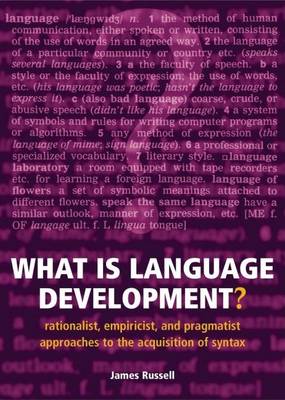
- Retrait gratuit dans votre magasin Club
- 7.000.000 titres dans notre catalogue
- Payer en toute sécurité
- Toujours un magasin près de chez vous
- Retrait gratuit dans votre magasin Club
- 7.000.000 titres dans notre catalogue
- Payer en toute sécurité
- Toujours un magasin près de chez vous
What Is Language Development?
Rationalist, Empiricist, and Pragmatist Approaches to the Acquisition of Syntax
James Russell
Livre broché | Anglais
120,95 €
+ 241 points
Description
Language development is one of the major battle grounds within the humanities and sciences. This is the first time that the three major theories in language development research have been fully described and compared within the covers of a single book. The three approaches: (1) The rationalism of Chomsky and the syntactic nativism that it entails; (2)The empiricism instinct in connectionist modelling of syntactic development; (3) The pragmatism of those who see the child as actively constructing a grammatical inventory piece-by-piece through recruiting general learning abilities and socio-cognitive knowledge. The book is unique in striking a balance between broad philosophical assessment of these three theories and fine-grain, fairly technical, accounts of how they fare at the empirical and linguistic 'coal faces.' In Part I, the kind of psychology to which rationalism, empiricism, and pragmatism give rise are described with reference to philosophers such as Fodor, Hume, and the American pragmatists from Piece, to Rorty, and Brandom. After an introduction to the syntactic analysis of the sentence, Part 2 continues with an account of the evolution of Chomskyan theory from its inception to present day, followed by a review of developmental research inspired by it. Part 3 takes a sceptical look at connectionist modelling of syntactic development. Part 4 describes the kind of linguistic theories that the socio-cognitive approach find sympathetic, reviewing its empirical progress (e.g., the work of Tomasello), ending with a comparison of how the generativists and functionalists tackle the evolution of syntax. Clearly and accessibly written, the book will be an important text for the developmental psychologists, linguists, and philosophers working on language.
Spécifications
Parties prenantes
- Auteur(s) :
- Editeur:
Contenu
- Nombre de pages :
- 570
- Langue:
- Anglais
Caractéristiques
- EAN:
- 9780198530862
- Date de parution :
- 09-09-04
- Format:
- Livre broché
- Format numérique:
- Trade paperback (VS)
- Dimensions :
- 239 mm x 168 mm
- Poids :
- 952 g







